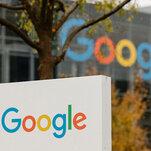
Alphabet Shrugs Off Advertising Slump, Thanks to Search Engine
After years of easy financial growth and booming popularity, Alphabet, Google’s parent company, has in recent months faced mounting questions about its future. It has been under the gun to deliver artificial intelligence technology, its sales growth has decelerated, and it is laying off 12,000 employees to cut costs.
On Tuesday, Google shrugged off some of those questions, returning to sales growth in defiance of a slowdown in digital advertising.
The company reported revenue of $69.8 billion in the first three months of 2023, up 3 percent from a year earlier and beating analysts’ average estimate of $68.9 billion. Its profits fell 8 percent, to $15 billion — the fifth consecutive decline — though Alphabet said it recorded $2.6 billion in charges related to recent layoffs and office space reductions.
Google still faces significant challenges. Its video platform, YouTube, continues to be crimped by the ad slump and rival Microsoft has gained buzz and users after incorporating an A.I. chatbot into its search engine, Bing.
But Tuesday’s results highlighted Google’s enviable advantage as a gateway to the web for billions of people around the world, a position that cannot be dislodged quickly or easily.
In particular, Google’s search engine, the core of the world’s largest digital advertising machine, remained strong. Revenue from the search engine rose almost 2 percent. to $40.4 billion, in the first quarter, higher than analysts’ estimates of $39.4 billion. The company said travel firms and retailers had spent more to reach customers on the search platform.
Sante Faustini, who runs product intelligence at M Science, a data research firm, said in an interview that Google’s search engine was the driving force of the company’s rebound, in a sign of the service’s “resilience” against larger economic forces.
Starting last year, rising interest rates and inflation had made advertisers thriftier, undermining the sales and profit of Google and its peers Snap and Meta, which owns Facebook and Instagram. Google’s sales had declined slightly at the end of last year.
That had put Alphabet under growing pressure to reassure investors it could still deliver revenue and profit gains, after years of gravity-defying leaps. Mark Mahaney, an analyst at Evercore ISI, encapsulated Wall Street’s demands in a recent note, in which he pushed the company to shed expenses, stabilize core businesses including YouTube and accelerate the release of artificial intelligence technology.
The internet giant said in January it would cull 12,000 people, or 6 percent, of its global work force, from its payroll. As of March 31, Alphabet had 190,711 employees, compared with 190,234 at the end of last year. The company’s layoffs did not officially go into effect until the end of last month.
At the same time, Google’s search engine appeared threatened by a wave of chatbots that have captured the public imagination. In particular, tools from Microsoft and OpenAI, the maker of the popular ChatGPT chatbot, have begun testing Google’s mettle.
In March, Google released a chatbot called Bard to mixed reviews, but the company does not generate revenue from the tool. The New York Times has reported that Google will incorporate conversational A.I. features into its flagship search engine in May, and has begun work on a new, more personalized search engine designed to take advantage of A.I. advances.
Last week, Alphabet consolidated its main A.I. teams into one unit, Google DeepMind, to make quicker progress in the field. The move combined the London-based A.I. lab DeepMind with Google Brain, part of the company’s research division. DeepMind’s chief executive, Demis Hassabis, assumed control of the group. Jeff Dean, Google’s top research executive, had previously overseen Google Brain, which he co-founded.
In an earnings call on Tuesday, Sundar Pichai, Alphabet’s chief executive, said the company had made “good progress” in A.I., comparing it to the company’s transition from desktop to mobile computing more than a decade ago.
“Our investments and breakthroughs in A.I. over the last decade have positioned us well,” he said, while promising a raft of new A.I. features in everything from Android smartphones to software for other businesses. He added that he hoped Google’s efforts to develop A.I. features would help the company retain its large user base.
“We’ll continue to incorporate generative A.I. advances to make search better in a thoughtful and deliberate way,” he said.
Advertising sales at YouTube, Google’s video platform, dipped almost 3 percent, to $6.7 billion, in the first quarter, narrowly ahead of the $6.6 billion expected by analysts. The division has recorded declining revenue in recent months amid increased competition from TikTok. Apple’s privacy changes for its iPhones have also tamped down the growth of social media platforms by making it more difficult to prove to advertisers that their ads are effective.
Sales at Google Cloud, the division that offers software and technology services to other businesses, jumped 28 percent to $7.5 billion. For the first quarter, the division reported a profit for the first time, of $191 million.

